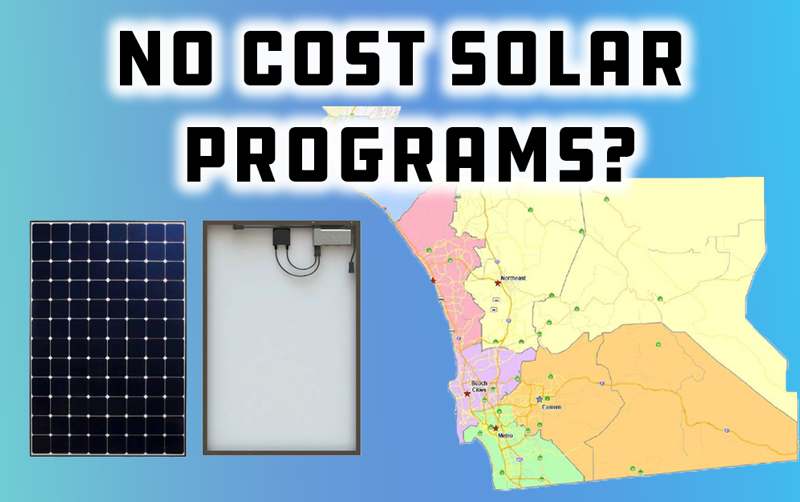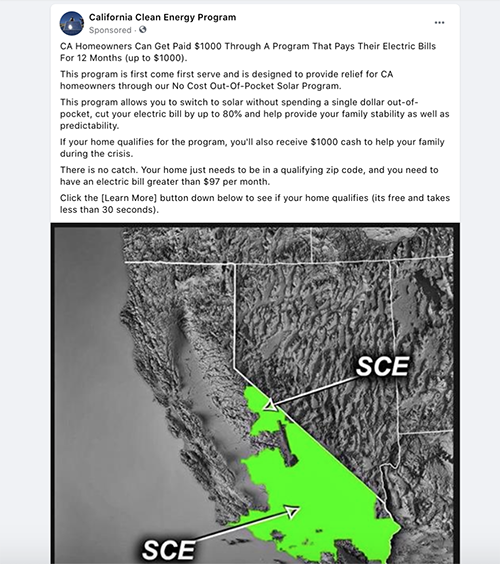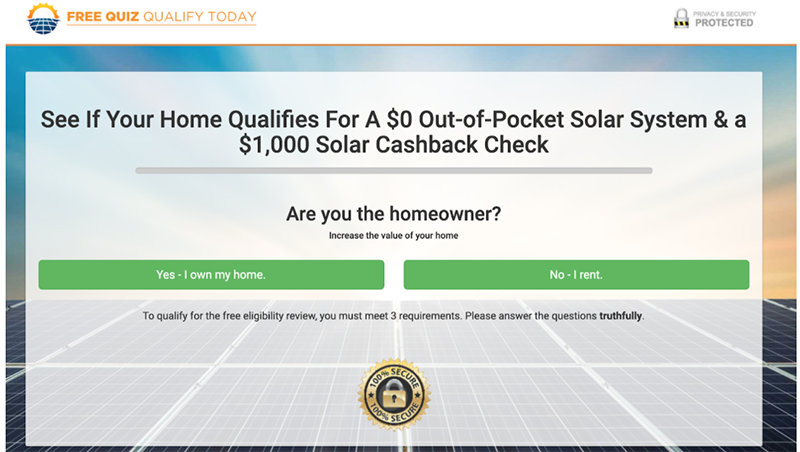
You’ve probably seen the ads while scrolling through Facebook. They read like: “San Diego County No-Cost Solar Program” or “No-Cost Solar Program in San Diego”. To the untrained eye, these ads may not even look like ads, they may be disguised as an article, or even some kind of government funded awareness campaign. Due to their deceptive looks and wild claims, these types of ads are often enticing, and as a result, homeowners will often submit their information through one of these ads without much skepticism about whether the ad is legitimate.
What most people don’t know is that when they submit their information through one of these ads, they aren’t signing up for any government program, they are actually giving their information to a lead generation company that then sells that information to a pool of solar companies.
The truth is, there are no “Government No Cost Solar Programs,” and the claims that there are such rebates and programs are false. These types of ads are created as a form of click bait to draw your attention and quickly collect your information – a typical method utilized by lead generation companies. These companies make money by collecting and then selling your info to solar companies for a fee. That’s why, if you’re a homeowner looking to go solar, you need to know what programs actually do exist, and how to spot the misleading ads.
The Myth of the “No Cost Solar Program”
Many ads that you see on Facebook, or in banner ads on websites, will often be designed and worded to look like they are either paid for by the government, or are a news article covering the “government program”.
The ad will say something like:
“San Diego County No Cost Solar Program allows homeowners to go solar at no cost”
“San Diego County Solar Incentive Program”
“Government Incentives allow Homeowners to Go Solar for $0 Upfront”
Often, the landing page or website itself will be designed in a way that makes it look like an official government website — or some form of educational program. This often leads consumers to believe that they are signing up for something that is an actual government program — when in fact they are likely submitting their information to a solar lead generation company that will distribute their information to several solar companies in exchange for money.
Another typical feature of these types of ads is they stress there is some kind of limit or deadline for the benefits the “government program” is providing. These statements are used to create urgency for the consumer, so that they will be more likely to fill out a form. Typically, they will say things like:
“Program is limited to first 1,000 homeowners who sign up”
“For a limited time only”
“This program is First Come First Serve”
So, let’s take a look at an example of this types of ad so you can know what to look out for when researching solar.
Example
Let’s look at some examples of these kinds of ads and landing pages to see what techniques they are using to lure people in.

Here you can see there are several deceptive elements. The advertiser is listed as “California Clean Energy Program,” inferring that it is a state funded program. They also use the “first come first serve” language to stress urgency, and the “no cost out of pocket” line to generate interest among cost-conscious consumers. This one is especially misleading, as it claims to offer $1,000 to homeowners who go solar to “help families through the crisis.”
How do we know this? Let’s go to the landing page to find out.

No information about the company, just a landing page asking for your name, address, phone number, email. Now, this may still seem legitimate to some based on the “100% Secure” logo on the bottom, but look closely before you submit your information, and you’ll find what’s really happening to your information after you submit it.
It says: **By clicking here, I agree that up to one Solar Company can call me and send me text messages, potentially using automated technology and/or pre-recorded messages, using the number provided. I understand that at any point I may request to join the “Do Not Call” list and will not receive further communication. I understand that this consent is not required to make a purchase.”
So this leads you to believe you are getting an assessment, when really, they are taking your information and distributing “up to one Solar Company” that can call you and text using “automated technology”.
So, you can see that this ad disguised as a fake government solar program really is a way to collect your information and sell it to solar companies. Clearly, these lead generation tactics are dishonest, and that’s why you’re encouraged to look sharp and remember “buyer beware” when it comes to clicking on solar ads like these.
Do “Government Solar Programs” Actually Exist?
The truth is that solar incentives do exist, but there are only two of them, at least in California and they’re only indirectly “government funded.” These are the Federal Solar Tax Credit, and the California Solar Initiatives. Let’s take a look at these two programs to see what they entail, so we can know exactly what solar programs really do exist.
The Federal Solar Tax Credit
There are only one or two ways that a government agency will give you back some money when you buy solar, in order to make solar even more affordable. First is the 26% Federal Solar Tax Credit, which works like this: you can receive a federal income tax credit worth 26% of the cost of your solar installation. Unfortunately, for residential solar installations, the amount of that tax credit will decrease at the end of this year and then end completely after three years. So, there is an actual deadline if you want to save on going solar!
California Solar Initiatives (CSI)
There are a number of solar initiatives through the state of California that are available to low-income households. Specifically, there is the Single-Family Affordable Solar Homes
(SASH) program, that provides upfront rebates for single-family, low income homes to help more low income families go solar. The program was scheduled to be sunsetted in 2015, but was extended to 2021. The program, which is administered by Grid Alternatives, has already installed systems on more than 5,200 homes in California.
Another solar initiative operating in California is the Multifamily Affordable Solar Housing (MASH) program, which provides incentives to offset the initial cost of installing solar on multi tenant housing projects in California. Since its inception it aided in completing 358 solar projects throughout the state, equaling out to around 23.6 megawatts of electricity. Unfortunately, the funds allocated through this program for SDG&E are exhausted, but still exist for PGE and SCE territories.
Those are the only programs that exist: you have the 26% Federal Solar Tax Credit, and you have the California Solar Initiatives, and that’s it. No other programs exist, and no other are planned for the future. So, if you see any ads for other “Government No-Cost Solar Programs,” this is simply dishonest and a tactic to get you to submit your information.
No Cost Solar vs No Money Down Solar
It’s worth noting that there is a substantial difference between “No Cost Solar” and “No Money Down Solar” – even though these may sound very similar. As mentioned, First of all, there is no such thing as “no cost solar,” because, like most home improvements, solar is never free.
There is, however, such a thing as “no money down” solar financing which is available through solar companies. This is similar to buying a car with no money down — you don’t have to pay anything upfront, but instead you have a monthly loan payment that pays off your loan. Note that this is available through the solar and financing companies, and is also not a “government program”.
How to Identify Lead Generation Ads
As we said before, it is typically the solar lead generation companies that are creating these deceptive ads about fake government solar programs. When they get your information, they will then distribute it out to several companies, who will all bombard you with calls and emails. Often, homeowners who submit their information to these types of companies aren’t even aware it is being distributed, and are often deceived into believing they are signing up for a government program. That’s why it is extremely important to research whatever company you are submitting info to. Here’s a couple of things to look for and validate before submitting information to any solar company or solar “program”
- Suspicious Company Names: Companies with very generic names are typically ones to look out for. “San Diego Solar Company” or “San Diego Solar Program” are examples – you should be skeptical of any company that has an overly generic name. While not always true, it’s generally a good indicator that you should at least do more research about the company.
- Skimpy Social Media Profiles: A good indicator of the legitimacy of a company is their social media presence. If they’ve got little to no followers or posts on their Facebook page, or don’t have one at all, you should probably be skeptical.
- Skimpy Websites: Before you fill out a form anywhere, make sure you check out the website of the company asking for your information. If it is a one page website that is extremely generic, or you can’t find information about the history of the company or anyone who works there, you should be skeptical.
- Bad or No Reviews: This is an obvious one, but you should check out Yelp and Google Reviews to make sure that the company is legitimate and doesn’t have a ton of bad reviews. If they’re not on these platforms, or have overly bad reviews, you should probably steer clear.
- No other presence online: If you Google the company and they don’t have at least 10 listings on local directory sites, you should be skeptical. Any real and respectful company will have a presence online larger than just their website and social media.
So, if you’ve been wondering about advertisements you’ve been seeing regarding “No Cost San Diego Solar Programs” or “Government Solar Programs Allow Homeowners to Go Solar for Zero Down,” please know that these are deceptive claims — and that no such programs exist. These are simply ads designed to get your information and distribute it to as many companies as possible. It cannot be stressed enough that, before submitting your information to any company or “program”, that you should do your due diligence and know that you are submitting your information to a real, legitimate company.
